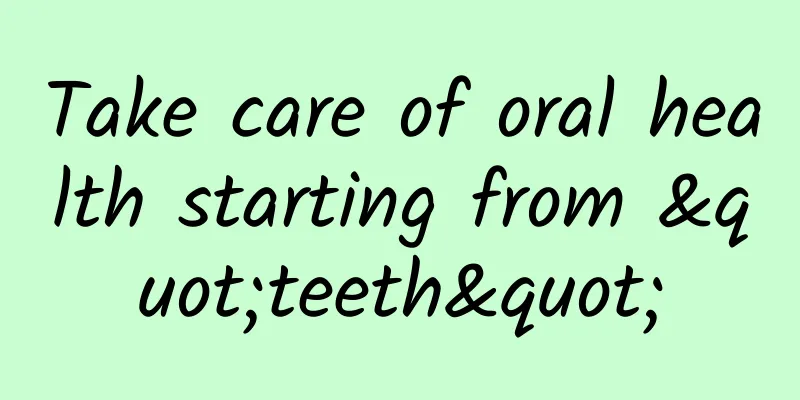Take care of oral health starting from "teeth"

|
In daily life, the oral cavity is an important organ that people often use. It not only helps people make sounds and talk to others, but also helps people chew and transport food reasonably, and helps promote the reasonable intake of human nutrition. Based on this, many medical workers call the oral cavity a "health gold mine" for people. However, due to the lack of sufficient knowledge of oral health, some people often pay relatively little attention to oral health in daily life, resulting in insufficient protection of oral health. Therefore, it is very important to protect oral health starting from "teeth". 1. Structure and function of teeth 1. Teeth are more than just tools for chewing Human teeth are mainly divided into four types: incisors, canines, premolars and molars. Each type of tooth has its own unique structure and function, and plays a different role in the mouth. The incisors are mainly used to tear food, the canines are used to bite and pierce food, and the premolars and molars are used to grind and chew food. 2. Tooth composition Each tooth consists of a crown and a root. The crown is the part exposed outside the mouth, which is mainly composed of enamel (the hardest tissue), dentin and pulp. The root is hidden under the gums and connected to the gums through the alveolar bone, playing the role of fixing and supporting the teeth. 2. The relationship between oral health and systemic diseases The oral cavity is a mirror of the health of the whole body. Oral diseases not only affect oral health, but also have a negative impact on the health of the whole body. Oral diseases are associated with a variety of systemic diseases, the most notable of which are cardiovascular disease and diabetes. The inflammatory response caused by oral diseases can aggravate the development of cardiovascular disease, and periodontal bacteria can also affect the blood sugar control of diabetic patients. Therefore, maintaining oral health is not only conducive to the health of the oral cavity itself, but also helps prevent the occurrence of a series of systemic diseases. 3. Scientific methods to protect oral health Oral health can be said to be an important part of people's overall health. It is not only related to the starting point of the digestive system, but also often affects people's appearance, language, social interaction, etc. Poor oral health may lead to tooth loss, oral pain, and even more serious health problems. Therefore, it is essential to actively understand and implement some effective oral health care measures. 1. Brush your teeth correctly It is generally recommended to brush your teeth at least two to three times a day, and each time should be controlled for more than two minutes. Before and after meals, it is best to rinse your mouth with tea to maintain oral hygiene. When choosing cleaning utensils, such as dental floss, toothbrush, toothpaste, etc., you must choose regular products to avoid "diseases from the mouth". Many people's brushing posture is not correct, which leads to inadequate oral cleaning and cannot play a good health care role. In addition, the brushing posture of some people is prone to gum damage, causing a series of health problems. The currently recognized effective brushing method is the Bass brushing method. The specific method is to tilt the toothbrush about 45 degrees and move back and forth on the gum surface. At the same time, the outer side, inner side and occlusal surface of the teeth should be cleaned separately. It can also be simply understood as rotating from top to bottom, not horizontally. At the same time, when brushing your teeth, don't forget to brush your tongue. Some of the tongue coating can cause tooth decay, periodontitis, etc., and bacterial metabolites can also cause bad breath. Specifically, you need to stick out your tongue, use the rubber tongue brushing area on the back of the toothbrush or a special tongue scraper to gently brush your tongue, and repeat several times to clean it. In addition, when choosing a toothbrush, it is best to choose one with moderate hardness and softness, so that the toothbrush can have a certain cleaning power while not hurting the gums and other tissues. Generally, you can choose a fine-bristled toothbrush with a pointed head and a small head. 2. Use dental floss and mouthwash Dental floss can effectively clean the plaque and food residues on the adjacent surfaces of teeth. Using dental floss once a day can supplement the deficiency of brushing. Mouthwash has the functions of sterilization, anti-inflammatory and fresh breath, but it cannot replace brushing and flossing. It should be used reasonably under the guidance of a doctor. 3. Regular dental check-ups It is recommended to have an oral examination every six months to one year to detect and treat oral diseases in a timely manner. Children and the elderly should increase the frequency of examinations appropriately. 4. Eat a healthy diet Reduce the intake of sweets and carbonated drinks, and eat more foods rich in vitamins, minerals and dietary fiber, such as fruits, vegetables, whole grains, etc. 5. Quit smoking and limit alcohol consumption Smoking and excessive drinking increase the risk of oral cancer and should be avoided as much as possible. 6. Avoid bad habits Do not bite your nails or use your teeth to chew hard objects to avoid wear and damage to your teeth. 7. Dealing with Oral Problems If you experience toothache, bleeding gums, bad breath, or other problems, you should seek medical attention promptly and do not ignore the presence of oral diseases. We can effectively protect oral health and prevent oral diseases through scientific oral care and healthy living habits. Oral health is not only the basis for showing a confident smile, but also an important part of maintaining overall health. Let us start with "teeth", care for our oral health, and enjoy a healthy and happy life. Author: Huang Dingyang Department of Stomatology, The First Affiliated Hospital of Guangxi University of Chinese Medicine |
>>: The secret of calcium supplement for children: making the road to growth more "calcium-rich"
Recommend
Where is the clitoris?
In sexual life, the female clitoris is stimulated...
Can I drink coffee after having an abortion?
Abortion is the termination of pregnancy through ...
Red core female cleansing liquid stings after use
In modern medicine, there are many ways to treat ...
What to do if the breast is blocked and there is a lump
Breastfeeding is very beneficial to the healthy g...
On TV, lung cancer can cause coughing up blood. Is this a symptom of lung cancer?
We often see such scenes on TV: lung cancer patie...
How to treat early vaginitis in pregnant women
Vaginitis is one of the common gynecological dise...
[Medical Q&A] What kind of damage does smoking cause to the oral cavity?
Planner: Chinese Medical Association Reviewer: Xi...
What can't you eat after abortion?
Many women who have an unexpected pregnancy and d...
Why do pregnant women have itchy feet?
As the pregnancy time of pregnant women increases...
Why do women always feel damp on the soles of their feet?
Many women experience this situation, that is, th...
How to remove vaginal odor?
For women, gynecological diseases are an inevitab...
Treatment of vaginal itching caused by candidal vaginitis
Caused by candidal vaginitis, accompanied by vulv...
How to wash the vulva effectively for itching?
Women often experience vulvar itching. For exampl...
What is methadone hydrochloride? Let's learn about it together!
Methadone hydrochloride is an opioid receptor ago...
Can practicing Tai Chi cure lumbar spondylosis? How to practice Tai Chi for lumbar spondylosis?
Tai Chi is a martial arts sport that conforms to ...









